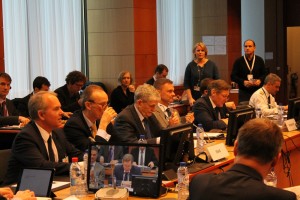Address to the Political and Security Committee of the European Council, by H.E. Mr. Mogens Lykketoft, President of the 70th session of the United Nations General Assembly
17 February 2016
Excellencies, ladies and gentlemen, good morning.
It is a pleasure to address you as the first Danish President of the UN General Assembly.
Today, I wish to speak to you, not about specific threats or individual on-going conflicts, but about the broader state of affairs relating to international peace and security.
I will however be happy to discuss individual issues in the discussions which follow.
Ladies and gentlemen, sitting in this Committee, I am reminded of the many times over recent decades that the EU has stepped forward on the international stage, helped strengthen multilateralism and shape the United Nations.
Since taking office, I have seen that multilateralism reassert itself in earnest, with major breakthroughs in the form of the 2030 Agenda for Sustainable Development and the Paris Climate Agreement.
The task before us now is to maintain the momentum generated by these agreements and to kick-start implementation across the world.
Not just because our Heads of State and Government have committed to doing so.
But because a failure to invest in the SDGs – particularly in the poorest countries – and to tackle climate change head on, will only serve to exacerbate the many challenges we are facing today.
This includes challenges such as disruption to the global economy, a potentially endless migration and refugee crisis and increased vulnerability to violent extremism.
At the same time, there can be no sustainable development without peace, and of course, neither without human rights.
But while multilateralism has re-asserted itself in relation to sustainable development, in the area of international peace and security, regrettably it seems to be in very real decline.
The horrific conflict in Syria is perhaps the best illustration of this.
A number of individual countries bear much of the responsibility for the suffering associated with that crisis.
But, it also serves to expose some glaring weaknesses at the heart of the systems and tools that we, the international community, have developed these past 70 years to prevent and resolve such conflicts.
Weaknesses that mean that we have been incapable:
- Of preventing tensions from escalating into all out conflict;
- Of protecting the lives of innocent civilians;
- Of securing access for basic humanitarian assistance;
- and, as of now, of facilitating a peaceful political settlement.
And other threats, particularly violent extremism and terrorism which are now at the top of the global agenda, present us all with a series of other challenges – which on the face of it, the international community seems ill-prepared to address.
________
In this context, however, and as the UN celebrates its 70th anniversary, it is fitting that a series of UN reviews are underway in the area of peace and security.
These reviews – on UN peace operations, peacebuilding and on women, peace and security – coupled with the process for selecting and appointing the next UN Secretary General, are genuine opportunities to reassert effective multilateralism in this sphere.
They present opportunities also for actors like the EU to reassert the values which are both at the heart of the European project and the UN Charter; values such as respect for international law, including international humanitarian and human rights law.
But what exactly is it that needs to change?
Of course, situations like Syria highlight once again that there are major problems at the heart of the Security Council.
The need for reform is undeniable – reform that provides us with a Council that is representative, transparent, effective and efficient; one that is capable of fully fulfilling its mandate in line with the spirit of the UN Charter.
In addition, however, a pattern is emerging from the different reviews regarding the need to recognize the primacy of politics; to increase investment in prevention; to advance a people centred approach to peace and security and to strengthen partnerships in this area, particularly with regional organizations.
On 10-11 May, I am convening a high-level thematic debate where I am inviting Ministers to provide their views on these and others issues which are needed for a new deal in the area of peace and security.
And I hope that Ministers from as many EU member states as possible, will join us.
This debate is also an opportunity to communicate clearly to the candidates for the position of UN Secretary General – who will all be invited to attend – the kind of improvements and changes that you expect of the UN itself in the coming years.
Ladies and gentlemen, before concluding allow me to address the position of the European Union in the world.
Today, the EU continues to play a key role within the international community of nations, supporting multilateralism and promoting the values of the UN Charter.
And I hope this role and these values will be further strengthened in the forthcoming EU Global Strategy for Foreign and Security Policy.
But, truth be told, the current tensions and divisions associated with the refugee crisis are undermining the EU’s voice, reputation and by extension, its influence.
I fully accept that these are very very difficult issues, but only a strong and united EU – one that sticks to its true values – can help the world address the global challenges that we all face today.
As a longstanding supporter of the EU, I urge all of you to do your best to bring this united EU to the fore once again.
Thank you.


